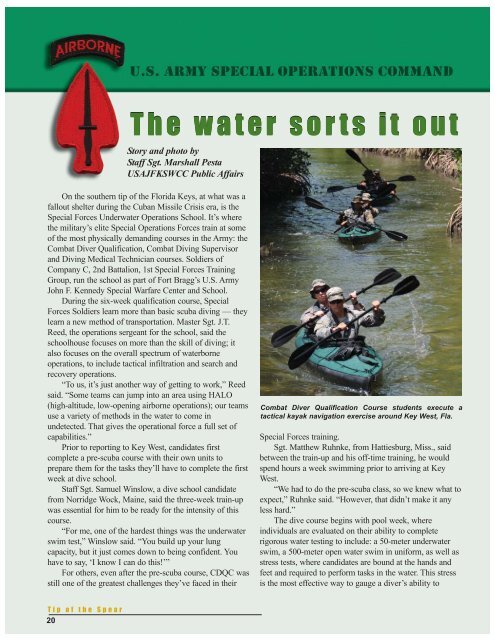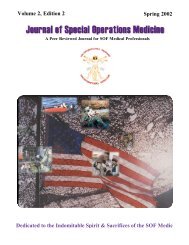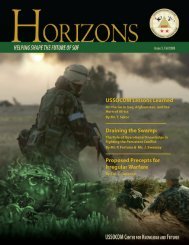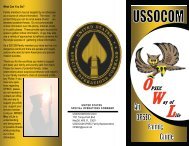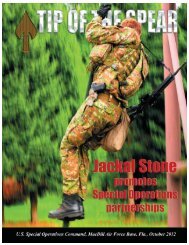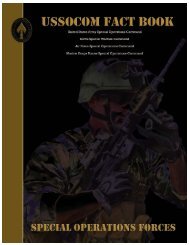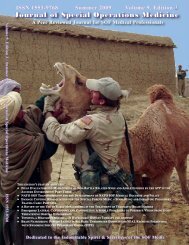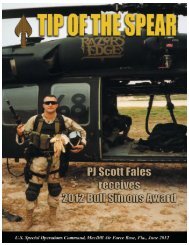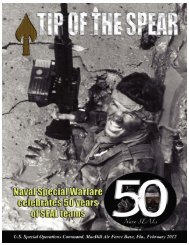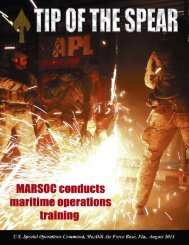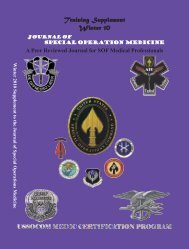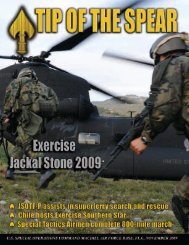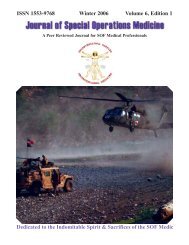December 2010 (6).qxd - United States Special Operations Command
December 2010 (6).qxd - United States Special Operations Command
December 2010 (6).qxd - United States Special Operations Command
Create successful ePaper yourself
Turn your PDF publications into a flip-book with our unique Google optimized e-Paper software.
The water sorts it out<br />
The water sorts it out<br />
Story and photo by<br />
Staff Sgt. Marshall Pesta<br />
USAJFKSWCC Public Affairs<br />
On the southern tip of the Florida Keys, at what was a<br />
fallout shelter during the Cuban Missile Crisis era, is the<br />
<strong>Special</strong> Forces Underwater <strong>Operations</strong> School. It’s where<br />
the military’s elite <strong>Special</strong> <strong>Operations</strong> Forces train at some<br />
of the most physically demanding courses in the Army: the<br />
Combat Diver Qualification, Combat Diving Supervisor<br />
and Diving Medical Technician courses. Soldiers of<br />
Company C, 2nd Battalion, 1st <strong>Special</strong> Forces Training<br />
Group, run the school as part of Fort Bragg’s U.S. Army<br />
John F. Kennedy <strong>Special</strong> Warfare Center and School.<br />
During the six-week qualification course, <strong>Special</strong><br />
Forces Soldiers learn more than basic scuba diving — they<br />
learn a new method of transportation. Master Sgt. J.T.<br />
Reed, the operations sergeant for the school, said the<br />
schoolhouse focuses on more than the skill of diving; it<br />
also focuses on the overall spectrum of waterborne<br />
operations, to include tactical infiltration and search and<br />
recovery operations.<br />
“To us, it’s just another way of getting to work,” Reed<br />
said. “Some teams can jump into an area using HALO<br />
(high-altitude, low-opening airborne operations); our teams<br />
use a variety of methods in the water to come in<br />
undetected. That gives the operational force a full set of<br />
capabilities.”<br />
Prior to reporting to Key West, candidates first<br />
complete a pre-scuba course with their own units to<br />
prepare them for the tasks they’ll have to complete the first<br />
week at dive school.<br />
Staff Sgt. Samuel Winslow, a dive school candidate<br />
from Norridge Wock, Maine, said the three-week train-up<br />
was essential for him to be ready for the intensity of this<br />
course.<br />
“For me, one of the hardest things was the underwater<br />
swim test,” Winslow said. “You build up your lung<br />
capacity, but it just comes down to being confident. You<br />
have to say, ‘I know I can do this!’”<br />
For others, even after the pre-scuba course, CDQC was<br />
still one of the greatest challenges they’ve faced in their<br />
Combat Diver Qualification Course students execute a<br />
tactical kayak navigation exercise around Key West, Fla.<br />
<strong>Special</strong> Forces training.<br />
Sgt. Matthew Ruhnke, from Hattiesburg, Miss., said<br />
between the train-up and his off-time training, he would<br />
spend hours a week swimming prior to arriving at Key<br />
West.<br />
“We had to do the pre-scuba class, so we knew what to<br />
expect,” Ruhnke said. “However, that didn’t make it any<br />
less hard.”<br />
The dive course begins with pool week, where<br />
individuals are evaluated on their ability to complete<br />
rigorous water testing to include: a 50-meter underwater<br />
swim, a 500-meter open water swim in uniform, as well as<br />
stress tests, where candidates are bound at the hands and<br />
feet and required to perform tasks in the water. This stress<br />
is the most effective way to gauge a diver’s ability to<br />
Tip of the Spear<br />
20


